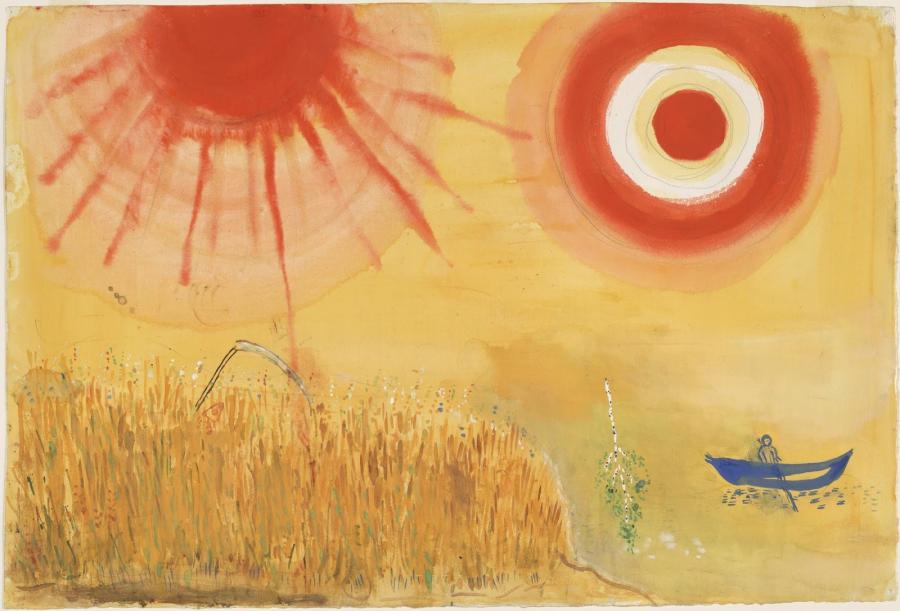YIDDISH ECOLOGIES: PROGRAM
FEBRUARY 16-17, 2025.
Panel times: 90 minutes each
SUNDAY – FRANKE INSTITUTE (REGENSTEIN LIBRARY)
Panel 1: 10:45-12:15pm
Lunch: 12:15-1:15pm
Panel 2: 1:15-2:45pm
3pm: Coffee
MONDAY – TEA ROOM, SOCIAL SCIENCES TEA ROOM
Panel 1: 9:15-10:45am
Panel 2: 11am-12:30pm
Lunch, 12:30-1pm
Panel 3: 1-2:30pm
3pm - Conclusion
SUNDAY PANELS
Opening Remarks.
Welcome, acknowledgements, announcements.
Panel 1: On Doikeyt And Postcolonialism
Moderator: AE Torres (Comparative Literature)
Madeleine Cohen, “Do’ikayt/Hereness between the human, the natural, and the built in the works of Moyshe Kulbak” (In-person)
Auden Finch, “Beyond the Speculative Borderlands: The Geo-Colonial Imaginaries of Lazar Borodulin’s Af Yener Zayt” (Zoom)
Eyshe Beirich, “Dead Stones, or Desolated Palestine” (In-person)
Panel 2: Ecological History
Moderator: Ken Moss Moderates (History)
Caleb Sher, “Between Shul and Swamp: Imagining Yiddish Nature Education with Avrom Golomb” (In-person)
Cecile E. Kuznitz, Building Doikeyt through Engagement with Nature: The Example of the Vilna “Cheap Houses” (In-person)
Hannah Pollin-Galay, “Forced Outside of Nature: Yiddish Ecopoetry of the Holocaust” (Zoom)
MONDAY PANELS
Panel 1: Eco Feminism And Gender Studies
Moderator: Anne Moss (Slavic)
Hinde Ena Burstin, “Der ruder fun khvayles [The churning of the waves]: Nature motifs in Shifre Kholodenko’s poetic cycle on menstruation” (Zoom)
Carolyn Beard, “Sorrow and the Samovar: Reading Gender and Landscape in Itzik Manger’s Ruth Cycle”(In-person)
Chana Toth-Sewell, ““Beehives and Birdsong: Animals, Landscape, and the Making of New Women in Alexandra Kollontai and Yente Serdatzky’s Fiction” (In-person)
Panel 2: Poetics Of Landscape
Moderator: Prof. Darya Tsymbalyuk (Slavic Dept)
Julia Koifman, “Landscapes of Exile: Deserts and Mountains in the Yiddish Poetry of Central Asia by Chaim Grade and Yitskhok Yanasovitsh” (In person)
Julian Levinson, “A Flood on the Argentine Pampas: Mordecai Alperson and the Modernist Moment in Yiddish Landscape Writing” (In-person)
Daniel Ari Baker, “Es Brent, Briderlekh: Bushfires in Australian Yiddish Fiction”
(Zoom)
Panel 3: Animal Studies
Moderator: Malynne Sternstein (Slavic)
Ber Kotlerman, “Peretz Hirschbein and Deer City in Japan” (In-person)
AE Torres, “On Dancing Bears” (In-person)
Michael Lukin, “Birds in the Yiddish Folk Songs: Semiotics of the Image” (In-person)
Concluding Remarks: Dr Jessica Kirzane.
THE CONFERENCE YIDDISH ECOLOGIES: VELDER, FELDER, BERG UN TOL WILL BRING TOGETHER STUDENTS, ARTISTS AND SCHOLARS TO CONSIDER NEW QUESTIONS RELATING ECOLOGY AND YIDDISH LANGUAGE AND LITERATURE:
- What is Yiddish ecology, and how does translation engage it?
- How did Yiddish poets encounter and translate North and South American, European, SWANA, and other landscapes across genres?
- How does philology shape ecological thinking? How were poetic encounters with ecology shaped by Yiddish language, philology, and linguistics?
- How did poets draw from vocabularies of nature – vernacular, scientific, botanical – to represent their experience of the landscape?
- How did Yiddish writers adapt forms (such as pastorals, hymns of praise for creation, or secular lyrics) to represent new environments?
- How might contemporary eco-criticism shed light on the corpus of Jewish writing about land?
- How are animals and animality represented in Yiddish literature?
- How are representations of land gendered in Yiddish verse?
- How do poets translate and transpose human entanglement with ecological systems through migration narratives?
- How did Yiddish artists and writers represent the ecological effects of war and genocide?
- Is “Doikeyt” an ecological movement/aesthetic?
Panels will include discussions of Eco-Feminism, Doikayt and Postcolonial Thought, Landscape Poetics, and others.

